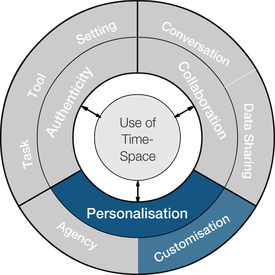Multilingual authoring for elementary students in Science and Languages
|
|
Focus: Personalisation, Customisation |
Vertical Divider
IntroductionIn this project the students from a range of different nationalities undertook a science project at Thornwick Bay, North Yorkshire. The project was to identify and record some of the organisms found on the seashore and to explore how mobile devices could be used to aid and enhance the learning.
Objectives of this scenario:
Description of the learning scenarioThis scenario considers both Science and Language. At the start of the project the students were asked to use different sampling techniques and procedures to collect data of the organisms.
The sampling procedures were discussed in the groups and then recorded. These data were then used to creative an interactive eBook using a range of applications (Tellagami, Stop Motion, BookCreator and Google Translator). While collecting data, the students searched for the relevant words in their own language(s) to name the organisms by using a translation application. Translating words into the student´s mother tongue made the task more personalized and therefore more engaging. Impact of the learning scenario on studentsHaving access to the translation matrix (which was downloaded so that this could be used off-line on location) gave the students a more personalised experience. Also the ability to be able to collect a range of data (images, text, video, sounds) both allowed for better and more accurate data collection (content) and also was more engaging for the students.
|


This scenario features the use of iPad devices by students with each student having access to a personal device to use during the activity.
Some images from the activity
|
How could this scenario be extended?There are a growing range of sensors that are available for the iPad - those these are still quite limited. As these develop then the options for using the iPad (tablet) for more serious data-gathering will also extent.
Also the eBooks could be used in a more digitally hybrid way with students dropping their own data into their books and developing a personalised, bespoke product. The eBooks themselves could be enriched by the use of more languages, glossaries, quizzes, and by making the eBooks more inclusive for students with special needs, e.g. subtitles, sign language, and also by using this as a virtual resource for those who are not able to access the seashore. |
Students involved in this creation of this scenario
Carolin Nüsse (Stuttgart Media University, Germany) Charlotte Kob (Rennbuckel Realschule, Karlsruhe, Germany) Paulo Barrios (Distance State University, Costa Rica) Swantje Luther (Universität Würzburg, Germany) Monica Amundsen (Metis Videregående, Bergen, Norway) |
